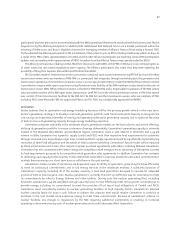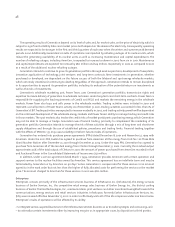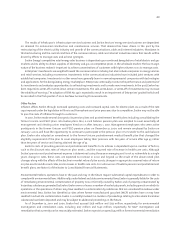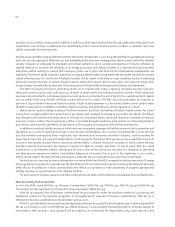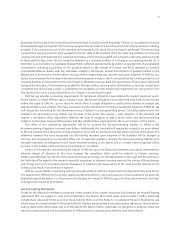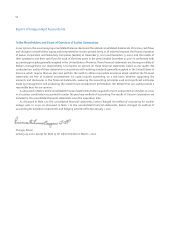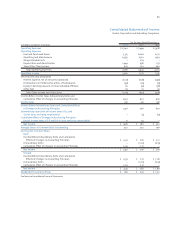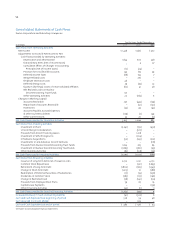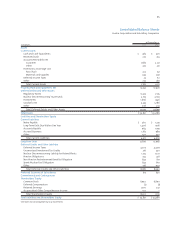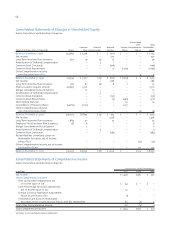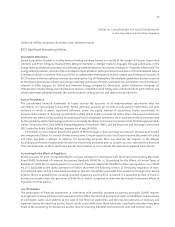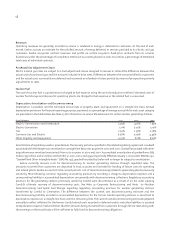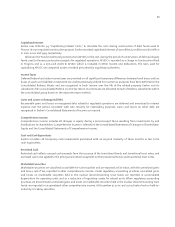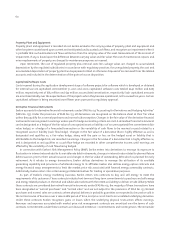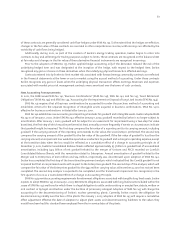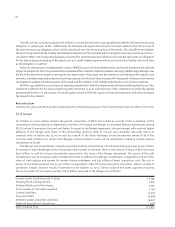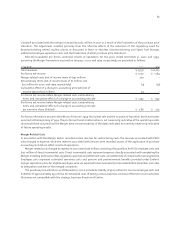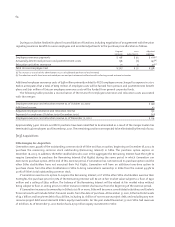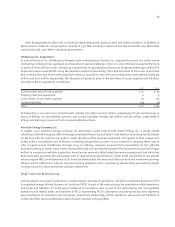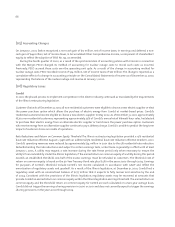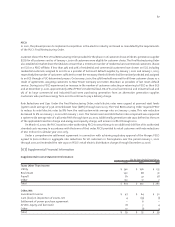ComEd 2001 Annual Report Download - page 59
Download and view the complete annual report
Please find page 59 of the 2001 ComEd annual report below. You can navigate through the pages in the report by either clicking on the pages listed below, or by using the keyword search tool below to find specific information within the annual report.
57
Notes to Consolidated Financial Statements
Exelon Corporation and Subsidiary Companies
(Dollars in millions,except per share data unless otherwise noted)
(01) Significant Accounting Policies
Description of Business
Exelon Corporation (Exelon) is a utility services holding company formed as a result of the merger of Unicom Corporation
(Unicom) and PECO Energy Company (PECO) (Merger). See Note 2—Merger. Exelon is engaged, through subsidiaries, in the
energy delivery, wholesale generation and the energy-related enterprises businesses. See Note 21—Segment Information.The
energy delivery business consists of the retail electricity distribution and transmission businesses of Commonwealth Edison
Company (ComEd) in northern Illinois and PECO in southeastern Pennsylvania and the natural gas distribution business of
PECO located in the Pennsylvania counties surrounding the City of Philadelphia. The wholesale generation business consists
of the electric generating facilities and energy marketing operations of Exelon Generation LLC (Generation) and Generation’s
interests in Sithe Energies, Inc. (Sithe) and AmerGen Energy Company LLC (AmerGen). Exelon Enterprises Company, LLC
(Enterprises) includes energy and infrastructure services, competitive retail energy sales, communications joint ventures and
other investments weighted towards the communications, energy services and retail services industries.
Basis of Presentation
The consolidated financial statements of Exelon include the accounts of its majority-owned subsidiaries after the
elimination of intercompany transactions. Exelon generally accounts for its 20% to 50% owned investments and joint
ventures, in which it exerts significant influence, under the equity method of accounting. Exelon consolidates its
proportionate interest in its jointly owned electric utility plants. Exelon accounts for its less than 20% owned investments
under the cost method of accounting. Accounting policies for regulated operations are in accordance with those prescribed
by the regulatory authorities having jurisdiction, principally the Illinois Commerce Commission (ICC), the Pennsylvania Public
Utility Commission (PUC), the Federal Energy Regulatory Commission (FERC) and the Securities and Exchange Commission
(SEC) under the Public Utility Holding Company Act of 1935 (PUHCA).
On October 20, 2000, Exelon became the parent of PECO through a share exchange and Unicom, the parent of ComEd,
was merged into Exelon. As a result of these transactions, Unicom ceased to exist and Exelon became the parent of ComEd
and PECO. See Note 2—Merger. In addition, for accounting purposes, PECO was deemed the acquiror in the Merger.
Accordingly, the financial statements of Exelon for the periods presented prior to October 20, 2000 represent the historical
financial statements of PECO and for the periods from October 20, 2000 include the operations acquired from Unicom.
Accounting for the Effects of Regulation
Exelon accounts for all of its regulated electric and gas operations in accordance with the Financial Accounting Standards
Board (FASB) Statement of Financial Accounting Standards (SFAS) No. 71, “Accounting for the Effects of Certain Types of
Regulation,”(SFAS No. 71) requiring Exelon to record in its financial statements the effects of the rate regulation. Use of SFAS
No. 71 is applicable to the utility operations of Exelon that meet the following criteria: (1) third-party regulation of rates;
(2) cost-based rates; and (3) a reasonable assumption that all costs will be recoverable from customers through rates. Exelon
believes that it is probable that currently recorded regulatory assets will be recovered. If a separable portion of Exelon’s
business no longer meets the provisions of SFAS No. 71, Exelon is required to eliminate the financial statement effects of
regulation for that portion.
Use of Estimates
The preparation of financial statements in conformity with generally accepted accounting principles (GAAP) requires
management to make estimates and assumptions that affect the reported amounts of assets and liabilities and disclosure
of contingent assets and liabilities at the date of the financial statements and the reported amounts of revenues and
expenses during the reporting period. Actual results could differ from those estimates. Significant estimates have been
made in the accounting for derivatives, nuclear decommissioning liabilities, environmental costs and pension costs.


